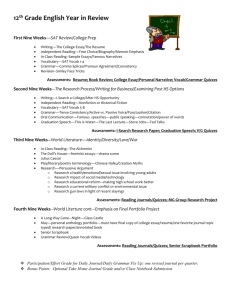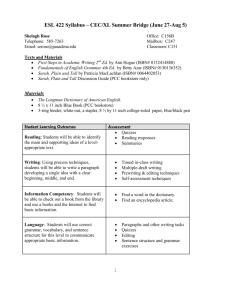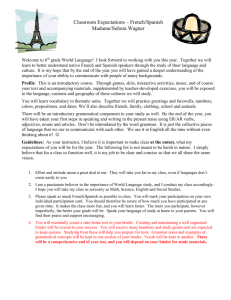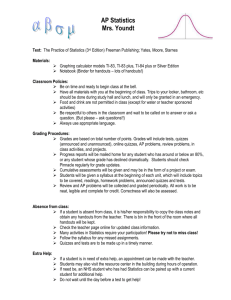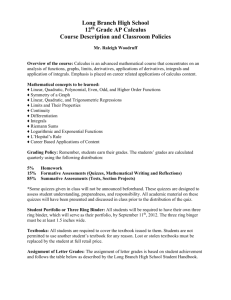Nombre: - WLWV Staff Blogs
advertisement
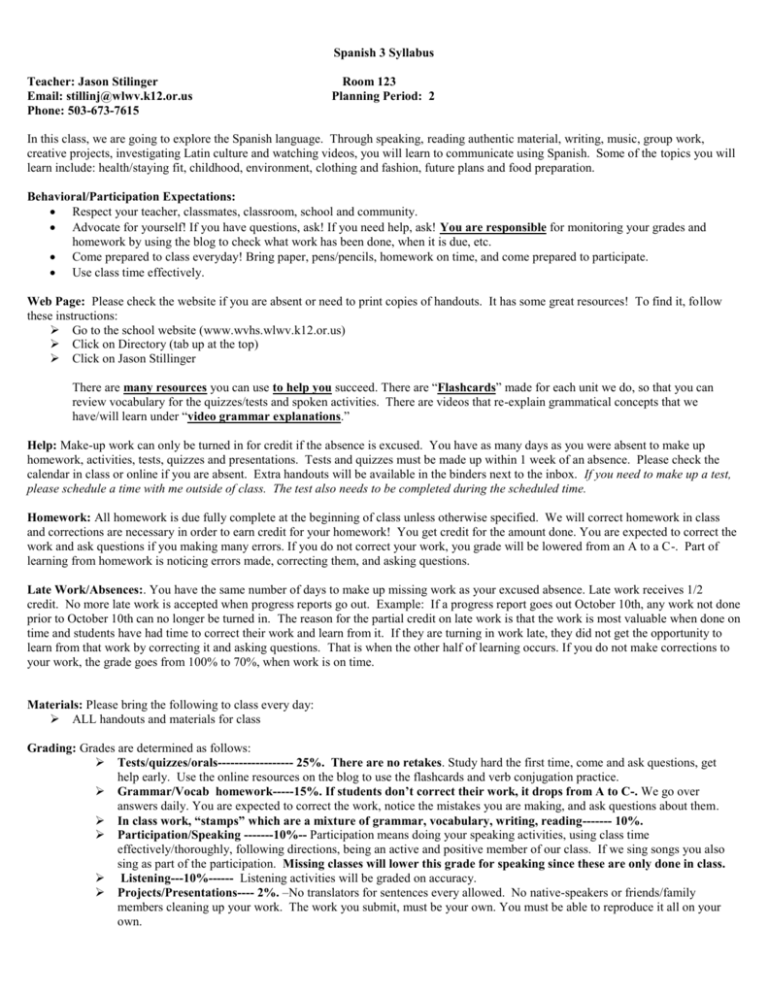
Spanish 3 Syllabus Teacher: Jason Stilinger Email: stillinj@wlwv.k12.or.us Phone: 503-673-7615 Room 123 Planning Period: 2 In this class, we are going to explore the Spanish language. Through speaking, reading authentic material, writing, music, group work, creative projects, investigating Latin culture and watching videos, you will learn to communicate using Spanish. Some of the topics you will learn include: health/staying fit, childhood, environment, clothing and fashion, future plans and food preparation. Behavioral/Participation Expectations: Respect your teacher, classmates, classroom, school and community. Advocate for yourself! If you have questions, ask! If you need help, ask! You are responsible for monitoring your grades and homework by using the blog to check what work has been done, when it is due, etc. Come prepared to class everyday! Bring paper, pens/pencils, homework on time, and come prepared to participate. Use class time effectively. Web Page: Please check the website if you are absent or need to print copies of handouts. It has some great resources! To find it, follow these instructions: Go to the school website (www.wvhs.wlwv.k12.or.us) Click on Directory (tab up at the top) Click on Jason Stillinger There are many resources you can use to help you succeed. There are “Flashcards” made for each unit we do, so that you can review vocabulary for the quizzes/tests and spoken activities. There are videos that re-explain grammatical concepts that we have/will learn under “video grammar explanations.” Help: Make-up work can only be turned in for credit if the absence is excused. You have as many days as you were absent to make up homework, activities, tests, quizzes and presentations. Tests and quizzes must be made up within 1 week of an absence. Please check the calendar in class or online if you are absent. Extra handouts will be available in the binders next to the inbox. If you need to make up a test, please schedule a time with me outside of class. The test also needs to be completed during the scheduled time. Homework: All homework is due fully complete at the beginning of class unless otherwise specified. We will correct homework in class and corrections are necessary in order to earn credit for your homework! You get credit for the amount done. You are expected to correct the work and ask questions if you making many errors. If you do not correct your work, you grade will be lowered from an A to a C-. Part of learning from homework is noticing errors made, correcting them, and asking questions. Late Work/Absences:. You have the same number of days to make up missing work as your excused absence. Late work receives 1/2 credit. No more late work is accepted when progress reports go out. Example: If a progress report goes out October 10th, any work not done prior to October 10th can no longer be turned in. The reason for the partial credit on late work is that the work is most valuable when done on time and students have had time to correct their work and learn from it. If they are turning in work late, they did not get the opportunity to learn from that work by correcting it and asking questions. That is when the other half of learning occurs. If you do not make corrections to your work, the grade goes from 100% to 70%, when work is on time. Materials: Please bring the following to class every day: ALL handouts and materials for class Grading: Grades are determined as follows: Tests/quizzes/orals------------------ 25%. There are no retakes. Study hard the first time, come and ask questions, get help early. Use the online resources on the blog to use the flashcards and verb conjugation practice. Grammar/Vocab homework-----15%. If students don’t correct their work, it drops from A to C-. We go over answers daily. You are expected to correct the work, notice the mistakes you are making, and ask questions about them. In class work, “stamps” which are a mixture of grammar, vocabulary, writing, reading------- 10%. Participation/Speaking -------10%-- Participation means doing your speaking activities, using class time effectively/thoroughly, following directions, being an active and positive member of our class. If we sing songs you also sing as part of the participation. Missing classes will lower this grade for speaking since these are only done in class. Listening---10%------ Listening activities will be graded on accuracy. Projects/Presentations---- 2%. –No translators for sentences every allowed. No native-speakers or friends/family members cleaning up your work. The work you submit, must be your own. You must be able to reproduce it all on your own. Reading and writing ----13 %.—Writing is based on accuracy/clarity/work toward improvement in quality. Reading is based on accuracy in answering comprehension questions and finding key elements. Final Exam ----15%: There will be a multiple choice, written and oral exam. . Help: If you are having trouble with what we are learning in class, please ask for help! You can schedule a time with me before school to get help or during lunches. I am in my classroom everyday for help between 8-8:30. If you need help afterschool, schedule some time. Cheating: It is NEVER tolerated. It will result in a zero on any assignment. This includes using online translators for whole sentences and paragraphs. This is your reminder! If you are caught cheating more than once, I will call home. This includes the person providing the answers. I don’t ask you to work beyond your level, but at your level so that I can assess your progress and give you feedback you need to improve/learn. Technology in Class: No iPods, cell phones or any other electronic devices without permission! You must ask me before you use any electronic device. There are no warnings; if I see them out without my permission, I will confiscate them until the end of the period. If I have to confiscate them more than once, you will need to pick up the device from the office at the end of the day. If you have any questions, please refer to p. 20 in the student handbook. Students have the responsibility to ensure that their electronic devices (cell phones, etc.) do not disrupt the learning environment. Such devices shall not be used during class time, including, but not limited to, instant messaging (TEXTING), downloading music, and digital photographing. Electronic devices that disrupt or are used inappropriately will be confiscated and returned to the parent or guardian. Furthermore, students must assume full responsibility in the event that their devices were lost or misplaced. In the unfortunate event that one of these electronic items (e.g. I-pods and cell phones) were lost or stolen, the school does not assume responsibility. Bathroom Passes: Each quarter, students will receive 5 bathroom passes to be used for leaving class (bathroom breaks, drinks of water). At the end of each quarter, students can turn in their bathroom passes for extra credit points. If bathroom passes are lost, they cannot be replaced! Put your name on them! Projects/papers/presentations: You may not use translators or outside help to clean up your work. When I see your work it should be a representation of what you, yourself, can do. If I suspect work is not your own, I will ask you to reproduce it. If you cannot, it will not be graded as your work and will receive a 0. What I am looking for it growth in your work, not perfection. Using online translators to write your sentences is cheating and will be treated as such. My definition of someone helping you is that they teach you something that allows you to reduplicate it on your own..an understanding or skill that allows you the ability to produce it on your own when you choose. “Help” is not someone doing your work and you getting credit. Test preparation: You can always visit the “semester 1, semester 2 final review” section off the blog to review concepts as we study them to re-watch videos explaining the grammar. They are on the left-hand side of the blog. There are links to online practice that you can do to practice the grammatical points. There are online flashcards on the blog already made for each unit. That will allow you to review the vocab for each unit. Review your notes frequently, over time and learning/memorizing verb endings/changes will help you do better on the tests also. You have all the notes in your vocab packets. Asking questions in class when you don’t understand is key.
